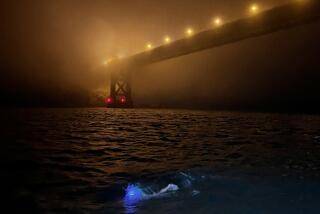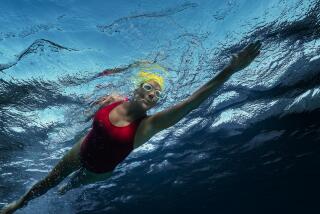Swimmer Is Bearing Straight for Russia
- Share via
Lynne Cox of Los Alamitos, who plans to swim the Bering Strait to Russia this week, has a complaint about the water at Nome, on the southern side of Alaska’s Seward Peninsula, where she has been training for several days.
It’s too warm. In fact, she said, at 56 degrees it is “tropical . . . like Southern California.” And getting warmer.
Cox, 30, is still awaiting official permission from the Soviet Union to land on Big Diomede Island.
She rode the weekly mail helicopter from the village of Wales on the western tip of the peninsula to America’s Little Diomede Island 26 miles offshore to check out conditions “and talk to the Eskimos,” she said by telephone from Nome.
She described accommodations on Little Diomede, where she is to start her swim, as “very, very primitive. You are probably in one of the most remote places in the world.”
The rocky little island is inhabited by 158 Eskimos, who fish and hunt walrus. They are watched by a Soviet observation post on top of a mountain on Big Diomede, 2.7 miles away. There is one telephone, and it is not always in service.
The air temperature was 36 but the water there was 40, slightly warmer than Cox expected. In 1976 Cox spent an hour in 42-degree water, without a wet suit, while swimming the 4.5-mile Straits of Magellan near the tip of South America.
Cox has been challenging herself in various bodies of water throughout the world since she was a teen-ager. Her adventures have included a 1973 swim across the English Channel, an ill-fated swim down the Nile memorable for “mud, slime, dead rats and raw sewage,” a seven-mile (“piece of cake”) swim off Japan and encounters with “jellyfish as big as trash can lids” on a 12-mile swim from Denmark to Sweden.
Although the channel between Little Diomede and Big Diomede is only 2.7 miles wide, Cox estimated that she might have to swim six or seven miles overall because of strong tides and a three-knot current.
“If we go all the way across, I’d like to make it in 2 1/2 hours,” she said.
Medical personnel will monitor her swim to study the effects of hypothermia. She is scheduled to return to Little Diomede on Wednesday and make the swim as soon as weather conditions permit, perhaps as early as Thursday. She and her group expect to take most of their own food and camp in sleeping bags on the floor of the schoolhouse.
The project originally was budgeted at $160,000, considerably more than any of Cox’s previous efforts, which primarily were funded by her earnings as a free-lance writer and by her father, a radiologist. She has fallen far short of that financial goal, although she has some limited commercial sponsorships.
Cox is optimistic that the Soviets will grant permission to cross the International Dateline into their territorial waters and land on Big Diomede, which has a small Soviet army installation.
“I’ll go as far as the Soviets will let us go, and I hope that they’ll work with us on it,” she said.
“Telexes have gone out to all the (Russian) sports, medical people and political people that have a say, so they definitely know about it,” Cox said. “We haven’t had any response officially yet, other than their requesting the passport numbers and saying, ‘What would you like from us?’ ”
Bob Walsh, chief executive officer for the U.S.-Soviet Goodwill Games scheduled at Seattle in 1990, presented Cox’s case to Soviet officials during a trip to the Soviet Union two weeks ago. He said he received a Telex on Thursday saying: “Your proposal is being reconsidered and we will advise you of our decision later.”
“The people I’ve talked to are the people who should be able to make it happen. The only thing that might stop it is if there might be a security problem (on Big Diomede),” Walsh said.
He added that the Soviets commonly approve such projects only at the last minute and usually do not grant visas “until the day before you’re going to depart.”
Cox’s party has given the Soviets a list of things it would like to have on the other side, including hot coffee, chocolate, a hot bath and a Russian scarf, or babushka, for Cox to wear in post-swim photos.
Meanwhile, the swimmer is taking the delay in stride.
“It’s just part of it,” Cox said. “In Chile we had to get permission to do the Straits of Magellan, but it took a day.”
More to Read
Sign up for Essential California
The most important California stories and recommendations in your inbox every morning.
You may occasionally receive promotional content from the Los Angeles Times.













